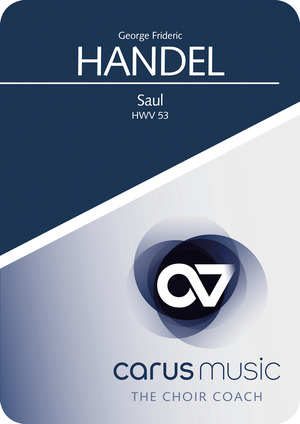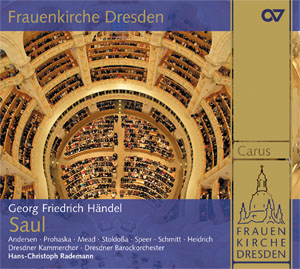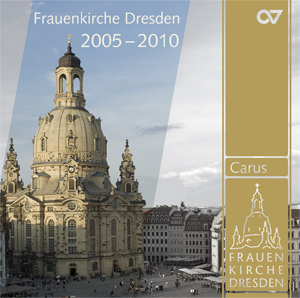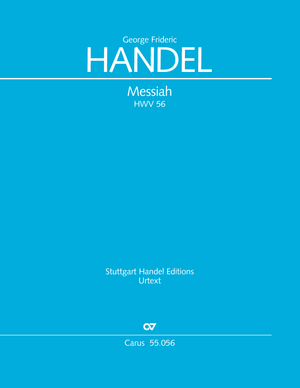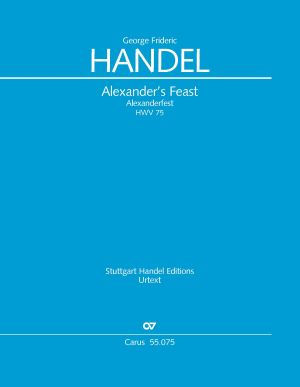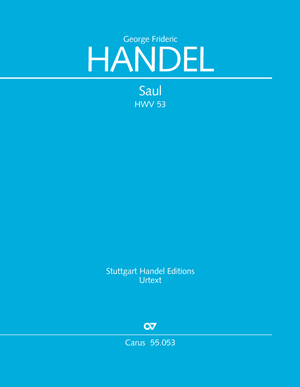
Georg Friedrich Händel Saul
Oratorio HWV 53, 1739
- Scoring:
- Soli SATB, Coro SSATB, 2 Fl, 2 Ob, 2 Fg, 2 Tr, 3 Trb, Timp, 2 Vl, Va, Arpa, Carillons, Org, Bc
- Search for works with similar scoring
- Language:
- english/german
- Duration:
- 164 min
- Difficulty level:
- 1 2 3 4 5
 View
View
 Listen
(86)
Listen
(86)
- Purchase the work as a CD or download.
- Symphony
- Chorus: How excellent thy name
- Air (Soprano): An Infant rais’d
- Trio: Along the monster Atheist
- Chorus: The Youth inspir’d
- Chorus: How excellent
- Recit. (Michal): He comes, Air (Michal): O God-like youth!
- Recit. (Abner, Saul, David): Behold, O King
- Air (David): O King, your favours with delight
- Recit. (Jonathan): O early piety!
- Air (Merab): What abject thoughts
- Recit. (Merab): Yet think
- Air (Jonathan): Birth and fortune I despise!
- Recit. (High Priest): Go on, illustrious pair!
- Air (High Priest): While yet thy tide
- Recit. (Saul): Thou, Merab, first in birth
- Air (Merab): My soul rejects the thoughts
- Air (Michal): See with what a scornful air
- Air (Michal): Ah! lovely youth!
- Symphony
- Recit. (Michal): Already see
- Chorus: Welcome, welcome, mighty King!
- Accompagnato (Saul): What do I hear?
- Chorus: David his ten thousands slew
- Accompagnato (Saul): To him ten thousands!
- Air (Saul): With rage I shall burst
- Recit. (Jonathan, Michal): Imprudent women!
- Air (Michal): Fell rage and black despair
- Recit. (High Priest): This but the smallest part
- Accompagnato (High Priest): By thee
- Recit. (Abner): Rack’d with infernal pains
- Air (David): O Lord, whose mercies
- Symphony
- Recit. (Jonathan): ’Tis all in vain
- Air (Saul): A serpent in my bosom
- Recit. (Saul): Has he escaped my rage?
- Air (Merab): Capricious man
- Accompagnato (Jonathan): O filial piety!
- Air (Jonathan): No, cruel father, no!
- Air (High Priest): O Lord, whose providence
- Chorus: Preserve him for the glory
- Chorus: Envy! eldest born of Hell!
- Recit. (Jonathan): Ah! dearest friend
- Air (Jonathan): But sooner Jordan’s stream
- Recit. (David, Jonathan): O strange
- Air (David): Such haughty beauties
- Recit. (Jonathan): My father comes
- Recit. (Saul, Jonathan): Hast thou obey’d
- Air (Jonathan): Sin not, O King
- Air (Saul): As great Jehova lives
- Air (Jonathan): From cities storm’d
- Recit. (Jonathan, Saul): Appear, my friend
- Air (David): Your words, O King
- Recit. (Saul): Yes, he shall wed my daughter!
- Recit. (Michal): A father’s will
- Duet (Michal, David): O fairest
- Chorus: Is there a man, who all his ways
- Symphony
- Recit. (David): Thy father is as cruel
- Duet (David, Michal): At persecution
- Recit. (Michal, Doëg): Whom dost thou seek?
- Air (Michal): No, no; let the guilty tremble
- Recit. (Merab): Mean as he was
- Air (Merab): Author of peace
- Symphony
- Accompagnato (Saul): The time at length
- Recit. (Saul, Jonathan): Where is the son
- Chorus: O fatal consequence of rage
- Accompagnato (Saul): Wretch that I am
- Recit. and Accompagnato (Saul): ‘Tis said
- Recit. (Witch, Saul): With me what would’st
- Air (Witch): Infernal spirits
- Accompagnato (Samuel, Saul): Why hast thou
- Symphony
- Recit. (David, Amalekite): Whence comest
- Air (David): Impious wretch
- Dead March
- Chorus: Mourn, Israel
- Air (High Priest): O let it not in Gath be heard
- Air (Merab): From this unhappy day
- Air (David): Brave Jonathan his bow
- Chorus: Eagles were not so swift as they
- Air (Michal): In sweetest harmony
- Solo (David) and Chorus: O fatal day!
- Recit. (High Priest): Ye Men of Judah
- Chorus: Gird on thy sword
 Additional material
Additional material
- Purchase additional material as a download product.
-
 text (without music) for download, html file, Singing text, originalhtml file, Singing text, original (Sample)Symphony Act I Scene 1
text (without music) for download, html file, Singing text, originalhtml file, Singing text, original (Sample)Symphony Act I Scene 1An Epinicion, or Song of Triumph, for the victory over Goliah and the Philistines
1. Chorus of IsraelitesHow excellent thy name, O Lord,
2. Air (Soprano)
in all the world is known!
Above all heav’ns, O King ador’d,
how hast thou set thy glorious throne!An infant rais’d by thy command,
3. Chorus
to quell thy rebel foes,
could fierce Goliah’s dreadful hand
superior in the fight oppose.Along the monster atheist strode,
4. Chorus of Israelites
with more than human pride,
and armies of the living God
exulting in his strength defied.The youth inspir’d by thee, O Lord,
5. Chorus of Israelites
with ease the boaster slew;
our fainting courage soon restor’d,
and headlong drove that impious crew.How excellent thy name, O Lord,
Scene 2
in all the world is known!
Above all heav’ns, O King ador’d,
how hast thou set thy glorious throne!
Hallelujah.Saul, Jonathan, Merab, Michal, etc.; Abner introducing David; High Priest
6. Recitative (Michal)He comes, he
...
-
 text (without music) for download, html file, Introductory text, Frenchhtml file, Introductory text, French (Sample)Texte du livret du CD Carus 83.243
text (without music) for download, html file, Introductory text, Frenchhtml file, Introductory text, French (Sample)Texte du livret du CD Carus 83.243David Vickers
Traduction : Sylvie CoquillatAu début des années 1730, Haendel commence à faire représenter des oratorios anglais pendant le carême, période où il était interdit de donner des opéras italiens. Jusqu’à l’été 1738, il devient évident que des représentations d’opéras italiens ne seraient pas réalisables durant la saison suivante, si bien que Haendel s’affaire à préparer une série de concerts au King’s Theatre, composée presque exclusivement d’œuvres dans le style d’oratorio. Il écrit la partition de Saül entre le 23 juillet et le 27 septembre 1738 ; son oratorio à l’intention dramatique ambitieuse inaugure la saison le 16 janvier 1739 pour être donné six fois en tout.
Charles Jennens (1699/1700–1773) rédige le livret de Saül. Il a suivi des cours à Oxford, mais un diplôme lui a été refusé car il n’a pas reconnu la légalité de la monarchie de Hanovre. Contrairement aux Jacobites
...
-
 text (without music) for download, html file, Introductory text, Englishhtml file, Introductory text, English (Sample)Text from the CD Carus 83.243
text (without music) for download, html file, Introductory text, Englishhtml file, Introductory text, English (Sample)Text from the CD Carus 83.243David Vickers
In the early 1730s Handel began to perform English oratorios during Lent while Italian opera entertainments were forbidden. By summer 1738 it was evident that Italian opera ventures in London were not viable for the forthcoming season, so he set about preparing for a concert series at the King’s Theatre that almost entirely consisted of oratorio-style works. He composed the score of Saul between 23 July and 27 September 1738, and his ambitious dramatic oratorio opened the season on 16 January 1739, and ran for six performances.
The libretto of Saul was written by Charles Jennens (1699/1700–1773), who was educated at Oxford but prevented from gaining his degree because of his political opposition to the legitimacy of the Hanoverian monarchy. Unlike the “Jacobites,” who plotted to restore the Roman Catholic Stuarts from exile, Jennens was a staunch Protestant, and therefore
...
-
 text (without music) for download, html file, Introductory text, Germanhtml file, Introductory text, German (Sample)Booklet-Text der CD Carus 83.243
text (without music) for download, html file, Introductory text, Germanhtml file, Introductory text, German (Sample)Booklet-Text der CD Carus 83.243David Vickers
Übersetzung: Helga BesteIn den frühen 1730er Jahren begann Händel mit der Aufführung von englischen Oratorien während der Fastenzeit, während derer italienische Opern nicht aufgeführt werden durften. Bis zum Sommer 1738 wurde offensichtlich, dass Aufführungen italienischer Opern in der kommenden Saison nicht durchführbar sein würden, so dass Händel sich an die Vorbereitung einer Konzertreihe im King’s Theatre machte, die fast ausschließlich aus Werken im Oratoriumsstil bestand. Er schrieb die Partitur des Saul zwischen dem 23. Juli und 27. September 1738; sein ehrgeizig angelegtes dramatisches Oratorium eröffnete die Saison am 16. Januar 1739 und wurde sechs Mal aufgeführt.
Charles Jennens (1699/1700–1773) verfasste das Libretto für Saul. Er hatte eine Ausbildung in Oxford genossen; ein Abschluss blieb ihm jedoch verwehrt, da er die Rechtmäßigkeit der Hannoverschen Monarchie
...
-
 text (without music) for download, html file, Singing text, German translationhtml file, Singing text, German translation (Sample)Sinfonia Act I 1. Chorus
text (without music) for download, html file, Singing text, German translationhtml file, Singing text, German translation (Sample)Sinfonia Act I 1. ChorusWie groß und hehr ist, Gott, dein Nam’,
2. Air (Soprano)
ihn preiset alle Welt!
weit über alle Himmel, weit
strahlt deines hohen Thrones Glanz!Dem schwachen Jüngling rief der Herr:
3. Chorus
Erwach’ und dämpf’ der Feinde Mut.
Vergebens trotzte Goliath,
dem Gottgewählten ward der Sieg.Der Gottesleugner trat einher
4. Chorus
mit übermüt’gem Spott,
und des lebend’gen Gottes Heer,
hohnlachend trotzt der Frevler ihm.Der Jüngling stand in Gottes Kraft,
5. Chorus
erfechtend leichten Sieg.
Nun kehrt dem Heere Mut zurück,
da floh er ihm, der Frevler Schar.Wie groß und hehr ist, Gott, dein Nam’,
6. Recitative (Soprano)
ihn preiset alle Welt!
Weit über alle Himmel, weit
strahlt deines hohen Thrones Glanz!Er kommt, er kommt!
7. Air (Soprano)Heil! edler, bester Jüngling dir,
der Menschheit schönster Ruhm.
Unsterblich Heil! o Mädchen, dir,
die einst sein Arm als Braut umschließt.
Der Töchter Juda Seligste,
o wie...
Contents
-
Composer
Georg Friedrich Händel
| 1685-1759George Frideric Handel put his exceptionally versatile compositional abilities to the test at an early age. After moving to London in 1712, where he was appointed Composer of Musick for His Majesty’s Chapel Royal in 1723, he wrote numerous masterpieces for the royal court as well as his major opere serie. For many years he enjoyed triumphant successes with his operas, which were sung by outstanding performers, with serenades, and later also with oratorios such as Saul and Israel in Egypt. Over the years Handel’s reputation grew far beyond the city where he worked; some of his choral works, particularly Messiah, have enjoyed a performance tradition which remains unbroken to this day, and are sung by choirs throughout the world. Personal details
-
Editor
Felix Loy
| 1963
Reviews
...der Kritische Bericht knapp gefasst am Ende des Hauptbandes erscheint. So sind auch bei unübersichtlicher Quellenlage alle Entscheidungen der Herausgeber schnell und unkompliziert nachvollziehbar...
Gottesdienst und Kirchenmusik 2.2015
Mit der vorliegenden Neuedition ist zum ersten Mal überhaupt Notenmaterial verfügbar, das... die Dirigierpartitur, aus der Händel selbst seine Aufführungen leitete, als wichtigste Quelle berücksichtigt.
Baden vokal 01/2015
... Die vorliegende Neuausgabe basiert daher auf der Direktionspartitur, bezieht das Autograph aber als zweite Hauptquelle mit ein, da sie in einigen Fällen im Detail präzisere bzw. musikalisch sinnvollere Lesarten sowie zusätzliche Informationen enthält.
Toccata, September/Oktober 2014
As ever with Carus, the score is immaculately presented, clear, and authoritative.
Jeremy Summerly, Choir & Organ, September/Oktober 2014
Die Berücksichtigung dieser unschätzbaren Quelle [Anmerkung: der Direktionspartitur] brachte interessante und bedeutende Erkenntnisse hinsichtlich der Aufführungspraxis (z. B. Gebrauch der Orgel) und der Auswahl bzw. Abfolge der einzelnen Arien, Rezitative, Chöre und Instrumentalstücke des Werks mit sich.
singende kirche, 3/2014
Das Novum dieser Neuedition besteht darin, dass erstmals die originale Dirigierpartitur Händels als wichtigste Quelle berücksichtigt wird.
Gustav Danzinger, CHOR aktuell, 3/2014
Mit der vorliegenden Edition von Felix Loy ist nun Notenmaterial verfügbar, das die jüngsten Forschungen zu diesem dramatischsten aller Händel-Oratorien für die Aufführungspraxis verwertbar macht.
CONCERTO, das Magazin für alte Musik, Mai/Juni 2014
Reviews on our website can only be submitted by customers with a registered user account. A check whether the rated products were actually purchased does not take place.
Frequent questions about this work
Are there also different versions of Handel’s "Saul"?
Is a harp really necessary for performance?
How important is the carillon, and which instrument could it be replaced by?
What is the range of the carillon?
 There are no questions and answers available so far or you were unable to find an answer to your specific question about this work? Then click here and send your specific questions to our Customer Services!
There are no questions and answers available so far or you were unable to find an answer to your specific question about this work? Then click here and send your specific questions to our Customer Services!


